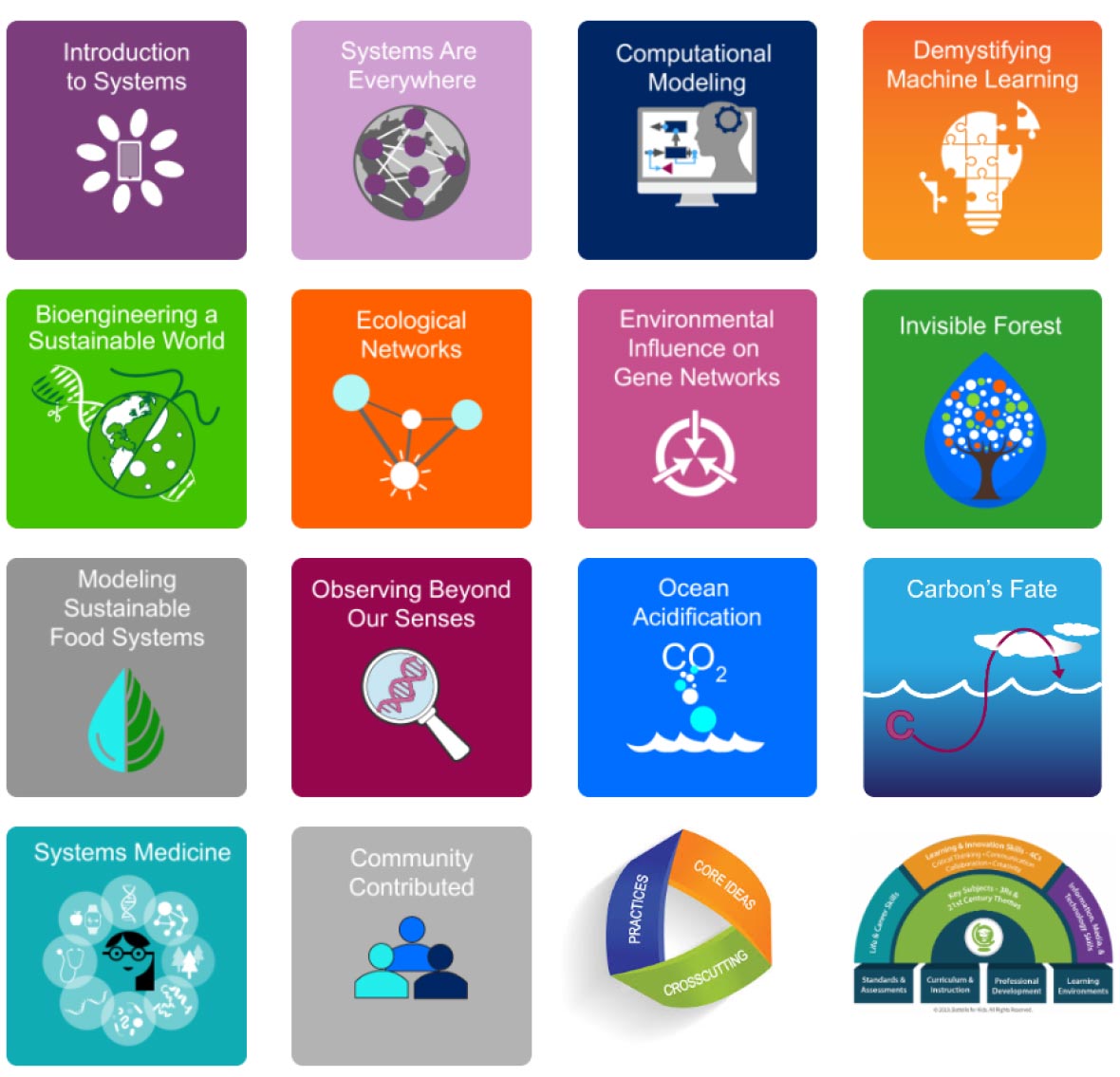Institute for Systems Biology
ISB, Institute for Systems Biology, is first and foremost a science research institute so we in the education group have a unique perspective on STEM education and offer the extremely relevant experience of our own STEM-professionals in all of our education work.
ISB is a valued education partner, as reported by educators, for the unique way we incorporate STEM professionals into the K-12 profession learning sessions we design and offer. Light bulbs go off when workshop teachers can identify that all 8 Science and Engineering Practices and all 7 Crosscutting Concepts are part of each STEM professional’s story. High school science teachers find the cutting edge research and content updates as a strong entry point in their journey with WSSLS/NGSS. Elementary and middle school teachers note they value connection to the passionate real world stories of scientific discovery and solutions to current issues. All teachers appreciate the ISB scientists’ understanding and value of the day-to-day work of K-12 science teachers.
ISB’s education team draws experience from years as pivotal leaders in science education, where we have worked as teachers, administrators, scientists, curriculum developers, and education researchers. ISB Education has 20+ years of experience forming long term partnerships with school districts to support growth of K-12 science programs. We design projects to meet the needs of diverse students, and a key way to do this is to work with all the science teachers in a system, so that the attitudes and beliefs about student learning are raised collaboratively. Therefore, we design projects to be systemic, across a whole district or grade band, that provide multiple years of professional learning strategically laid out along our Science Teacher Professional Growth Continuum.
OER & Classroom Resources
Among ISB’s ever-growing set of high school problem-based-learning modules, are several that provide exemplary supplementary units for climate science issues and standards. ISB hosts and regularly updates a teacher-friendly website for all the OER materials we use in the ClimeTime workshops; please view at https://see.isbscience.org/. New resources were added during the past school year with remote-learning and hybrid-learning strategies and formats.

Professional Learning Experiences
ISB weaves through each workshop series the 3-Dimensions of student science learning:
- DCIs – What students learn
- SEPs – What students do
- CCCs – What students think
The professional learning experiences follow our learning arc for educators — this develops teachers’ practice in a way that results in their students building their own STEM identity and increasing aspiration for STEM occupations.
- Personal learning by each teacher through experiencing contemporary important STEM content, careers, and approaches.
- Professional learning via teachers collaborating to prepare for instruction using best practices. Student voice strategies (learning progress heat maps, clicker surveys, reflection boards, and more) are modeled for and practiced by teachers.
- Action for student learning happens through teachers engaging their students in STEM learning experiences that build students’ aspiration for STEM career pathways, and by teachers analyzing evidence of learning across this network of educators.
Teacher Professional Learning
“Teachers Inspiring Science Students — CCCs in action to learn climate science: a ClimeTime project by ISB with ESD + district partners”
Features:
-
- We use a Systems Approach, working with teams of teacher colleagues towards equitably supporting each student.
- We facilitate STEM Professionals to engage with teachers around climate science issues, current research, and personal stories of life/school pathways in STEM fields.
- We model the use of a range of exemplary OER resources including ISB developed modules that provide authentic science investigations that engage students and bridge the distance between the professional lab and the classroom.
- We make the Crosscutting Concepts come to life, emphasizing their importance for each and every student, every grade throughout K-12 and exploring strategies for authentically integrating them into the classroom.
- We support teachers to observe student learning including using practical measures as they implement.
Results from 2020-2021 in partnership with ESDs:
ISB’s education team has a 20+ year track record of forming and nurturing science education partnerships in WA, through direct work on science reform projects in the greater Puget Sound region and statewide through Washington State LASER.At the time of the SARs-CoV-2 outbreak, ISB partnered with PSESD-121’s ClimeTime project to offer, urgently, a set of “Systems Are Everywhere!” workshops for teachers to see online science instruction modeled, and to receive coaching in order to implement the lessons in their own classrooms. In total 569 educators from 110 districts across all 9 ESDs participated in ISBs 18 ClimeTime workshops, and many of these teachers that sought out and participated were not those traditionally included in science professional development for in-depth support linking WSSLS and climate science. Please see the ClimeTime impacts report from school year 2020-21 at https://tinyurl.com/ISBFY2021.
Workshops
Systems Are Everywhere
Grade levels K-12: Elementary, Middle and High School
5 STEM Clockhours
Teachers of Science, any grade K-12, join the ISB team to explore systems! The purpose of this workshop is for K-12 teachers to deepen their learning about systems and systems thinking and to implement new resources and/or strategies into a science unit.
FEB. 3rd – JUNE 6th 2025: Canvas course opened Feb 3rd. Start when you can and work at your own pace. The course ends by June 6th.
Teaching in 3D: Refreshing our NGSS Practices, Concepts, and Ideas
Grade levels 6-12: Middle and High School
10 STEM Clock Hours
Building collegiality around a vision of what 3D science learning looks like from the student perspective coupled with many instructional moves, our course uses specific model lessons from OpenSciEd climate science units for participants to have direct experiences with each of the Crosscutting Concepts.
FEB. 28th – JUNE 6th 2025: Canvas course open Feb 28th, start when you can and work at your own pace, course ends by June 6th. We will meet together by Zoom a few times along the way.
Climate-themed SEE Modules
Grade levels 6-12: Middle and High School
12 STEM Clock Hours
ISB’s SEE modules help to fill several gaps in high school science course sequences such as Earth and Space Science DCIs. This course will provide professional learning to support teachers like you to link WSSLS and climate science while using best practices for 3D science learning.
FEB. 28th – JUNE 20th 2025: Canvas course open Feb 28th – work at your own pace. We can meet according to your schedule if needed, by Zoom a few times along the way. The series ends by June 20th.
NGSS 3D Science - Secondary Teacher Network
Grade levels 6-12: Middle and High School
10 STEM Clock Hours
Science, CTE and STEM teachers this course is for you! Gather your education team, cadres, departments and attend this course together. This course strengthens any science science core unit by building collegiality around a vision of what 3D science learning looks like from the student perspective coupled with many instructional moves, our course uses specific model lessons from OpenSciEd climate science units for participants to have direct experiences with each of the Crosscutting Concepts.
Reserve your team’s spot today! DATES will be customized for each district team.
Ask us about customizing workshops, district-wide STEM support, and more at education@isbscience.org.
Partners & Collaborators
- PSESD 121
- School district teams of teachers
I thought the idea of having an actual Scientist come into my classroom, or virtual classroom as it stands right now, would just be exciting for my students. I want to reach out to someone right away and see if they would be willing to visit us.
The scientist mentioned different career opportunities for different levels of education which would be great to share with my students.
Wonderful intro to systems thinking, the scientist interactions made it “real”, my brain is full!
Success Stories from Institute for Systems Biology
Systems are Everywhere!
The Systems Are Everywhere! Workshop was developed and led by the Institute for Systems Biology in collaboration with the Puget Sound ESD.
Climate Science through Chemistry
The rationale for this project is to support high school chemistry teachers for leading change.



